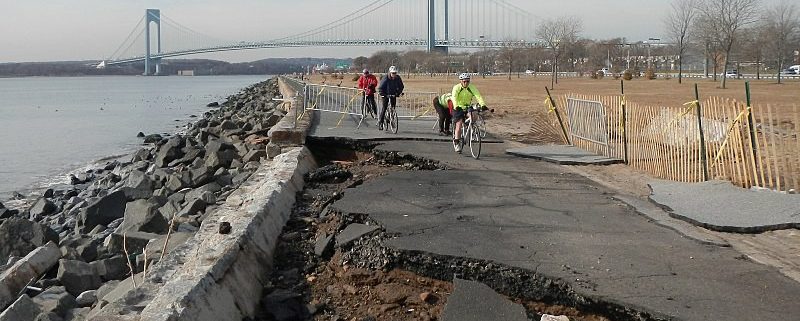
I remember that night, now more than five years ago, too well. I was in Bay Ridge, nervously watching TV and checking Twitter. Reports worsened by the hour. Fires in the Rockaways. Massive flooding on Long Island and New Jersey. Many feared dead.
I was lucky. My neighborhood was above sea level and my apartment building never lost power. At some point, I decided to venture outside, taking my camera with me. As a young journalist in my first job, Queens was my beat — I was a Queens Tribune reporter covering everything imaginable — but Brooklyn was my home. I entered the park across the street, walking down the steps toward the bridge that takes pedestrians over the Belt Parkway and to the promenade. Heading there was simply going “down by the water,” as my mom would say.
The water that night did not stay down. It rushed across the walking path, the bike path, and swallowed the Belt Parkway. I was awed and terrified. Here was the surreal made real, the very roadway I had zipped down thousands of times now underwater. My world would never be the same.
Last week, you may have read about the climate change platform I released for my State Senate campaign. I wanted to make sure I detailed it for you in full, as well as explain why I unveiled a standalone platform in the first place. One of my great frustrations as a journalist and voter is how little politicians actually talk about climate change. Entire televised presidential debates have passed without a mention. Given what’s a stake, that always struck me as especially ludicrous.
The district I am hoping to represent, New York’s 22nd, runs along the Southern Brooklyn waterfront. Hurricane Sandy lashed our shores and flooded many neighborhoods, though the media’s focus was on other impacted areas. People in my district understand just how crucial combating climate change and preparing for future storm surges really is — and why not attacking this existential threat in a serious way is shameful. My Republican opponent has been silent on the issue.
Below, you’ll find my plan. If you have any comments, feel free to drop me a line at [email protected]
Call for New York State to Divest Its Pension Funds From Fossil Fuel Companies
We can’t truly win the war on climate change and protect our future until we stop burning fossil fuels. The only way to guarantee we have an economy entirely reliant on clean, renewable energy is to move away from the use of fossil fuels as quickly as possible. New York State can join other governments around the world by making the critical choice to divest from companies that generate revenue from oil, gas and coal. This is both ethical and financially prudent. The energy industry is evolving — renewable energy has overtaken coal as the world’s largest source of power capacity. New York can’t call itself a leader in the climate justice movement until all pensions funds are divested from these destructive industries.
Join With Local Elected Officials to Fight for a Southern Brooklyn Storm Barrier
It is inexcusable that Brooklyn remains in the path of another devastating storm surge. The federal government has failed to even begin construction on a $3.8 billion coastal storm barrier project that would guard much of Southern Brooklyn from future flooding. Funding steams are reportedly drying up. If the Trump White House (not so surprisingly) won’t step up, it will be up to our state government to protect our neighborhoods. I will pressure the Feds to cough up the much-needed cash, but I also understand we can’t sit around and wait for this President to actually do what needed to be done. As a state senator, I will battle on the state level to ensure a small slice of our $150 billion budget is carved out for this crucial project. Lives are at stake and we can’t wait.
Fight Back Against Dangerous Overdevelopment of Our Waterfronts
Despite Brooklyn being no more prepared for another superstorm than it was in 2012, overdevelopment continues on our waterfront. Real estate developers are throwing up luxury condos, thanks to tax breaks doled out by Republicans in the State Senate and landlord-friendly Democrats, in areas prone to flooding, like Sheepshead Bay. I will pressure City Hall to adopt a new zoning code to cut down on runaway development along the Southern Brooklyn waterfront. We should not be building large housing developments in Flood Zones 1 or 2, which are highly vulnerable to future storms. Severe restrictions on height and the number of units must be placed upon all new construction in these areas. With water levels rising, there is no reason to place more Brooklynites in harm’s way. I will partner with local elected officials and fight against a developer-friendly City Hall to ensure more people aren’t endangered.
Pass the New York Climate and Community Protection Act
Yet another progressive piece of legislation that has been blocked by the Republican-controlled State Senate, the New York Climate and Community Protection Act would add a new article, Climate Change, to the environmental conversation law. It would, among other things, force the Department of Environmental Conservation to develop a climate action plan and create regulations to cut down greenhouse gas emissions statewide. The bill would also mandate that half of the electricity consumed in New York State come from renewable sources by 2030 and requires all of state government to consider climate and clean energy goals in their permitting and funding decisions. We must also set into law Governor Cuomo’s goal of eliminating all fossil fuel usage by 2050.
Support a New York Carbon Tax
If New York is to actually serve as a model for the nation, we must put a price on carbon emissions and enact a carbon tax. This is one of the only ways to substantially reduce near and long-term carbon emissions. A carbon tax alone could cut emissions nearly 36 percent by 2040. Ideally, a federal carbon tax would be enacted to cut emissions, but there is little hope of that with a climate change denier in the White House. A carbon tax could be used to offset other taxes or fund sustainability and climate adaption measures. It would also not be harmful to the economy: countries that have enacted carbon taxes, like Sweden, have grown their economies while drastically reducing emissions. With a tax in place, New York could truly begin to transition to a renewable energy future and fight climate change in a serious way.


